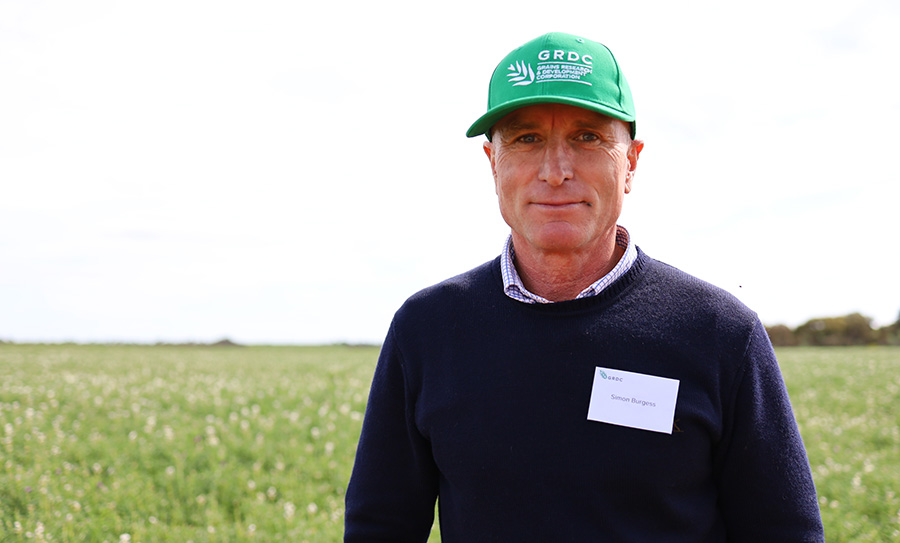Tasmania’s grain growers are set to learn from a line-up of leading experts undertaking research for the state’s grains sector at a Grains Research and Development Corporation (GRDC) update in Campbell Town on June 28.
The GRDC Grains Research Update is expected to attract grain growers, agronomists, consultants and researchers from across the state to learn about and discuss the latest in grains research.
GRDC Southern Panel member, Simon Burgess, says the experts coming would cover topics relevant to Tasmania and it was a great opportunity for growers to talk to them and to network with peers.

GRDC Southern Panel member Simon Burgess said the Grains Research Update would provide an ideal opportunity to access the latest research for Tasmanian grain growers. Photo: GRDC
“While we’re moving into an expected drier El Niño this year, we’re still reeling from last year’s wet conditions,” says Mr Burgess.
“Most soil in the Midlands experiences waterlogging in winter and it’s critical to understand what is going on underground – the session on subsoil amelioration will explore this.
“As for disease – Tasmania is the canary in the coal mine for Australia when it comes to diseases.
“New varieties are a really important tool in the toolbox to manage disease as we can’t continue to rely on the answers coming out of a drum.
“We also need to get a handle on disease management practices and improved control because they are the biggest challenges we have to come to terms with in Tasmania to continue cropping successfully.”
Update attendees will hear first-hand about Tasmania-based research including University of Tasmania trials exploring subsoil amelioration strategies and Field Applied Research (FAR) Australia trials aiming for hyper yielding cereals in Hagley.
FAR Australia senior research manager Darcy Warren, who will speak at the update, says he is excited about some of the newly commercialised cereal varieties suited to Tasmania and their robust disease resistance.
“With the long growing season and high disease pressure, Tasmanian growers are always at the forefront of fungicide use and resistance risk,” Mr Warren says.
“In the GRDC Hyper Yielding Cereals project, we’ve done a lot of work looking at different fungicide managements, disease pressure scenarios and sources of genetic resistance, all of which have provided some valuable strategies for growers to manage disease.”
In 2022, nine wheat varieties were grown at the FAR Australia Hagley Hyper Yielding Cereals field site with and without fungicide. In the presence of Septoria tritici blotch and stripe rust, the majority of varieties tested achieved higher yields with fungicide protection, however, two new lines had no yield penalty when grown without fungicide. Mr Warren will share more of the results at the Grains Research Update.
The full line-up of speakers and topics includes:
- Tackling diseases in hyper yielding cereals, Darcy Warren (FAR Australia)
- Ryegrass resistance snapshot and strategies for control, Peter Boutsalis (Plant Science Consulting)
- Developing agronomic fundamentals for faba beans, Greta Duff (Southern Farming Systems)
- Exploring subsoil amelioration strategies – insights from local based trials, Peter Johnson (University of Tasmania)
- Strategies for staff retention and recruitment, Sally Murfet (Inspire AG)
GRDC grower relations manager – south, Tim Bateman, says the speakers for the Campbell Town update were chosen based on grower input and interests.
“We’re excited about the line-up of experts, they will discuss topical issues and deliver new research findings and practical strategies relevant to Tasmanian growing conditions,” says Mr Bateman.
“The update will also be a great opportunity for growers, agronomists and other attendees to discuss ideas and share experiences, which all helps to raise the bar in terms of generating improved on-farm management practices adapted to each grower’s own farming enterprise.”
Registration for the update is essential:
- GRDC Grains Research Update – Campbell Town
The Grange Estate, 4A Commonwealth Lane, Campbell Town, Tasmania
Wednesday 28 June, 9am - 1pm (doors open at 8:30am)
Registration is essential – morning tea, lunch and proceedings provided.

























































